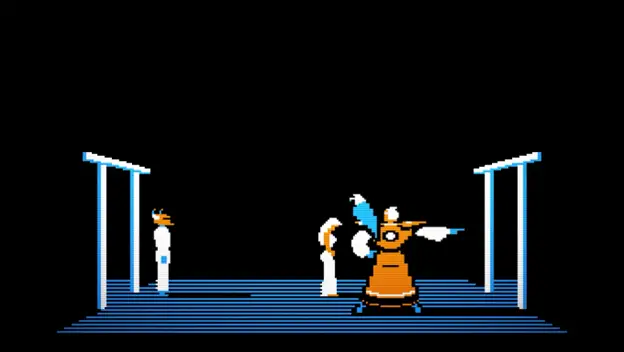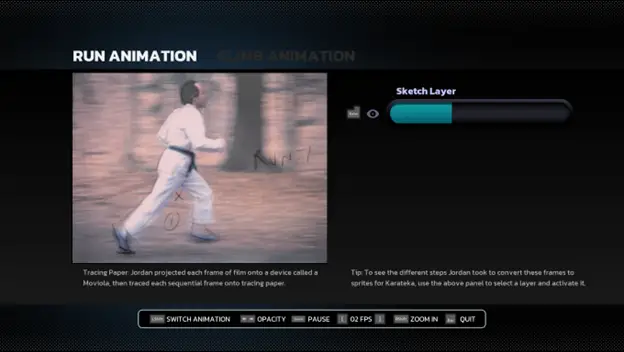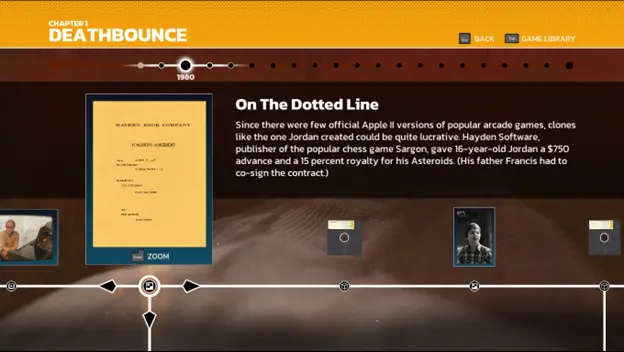The Making of Karateka is a beacon of light in otherwise dark times for games preservation. In this age of dead or dying media, this interactive documentary uses original footage and documents, source documents, in-progress game builds, and rebuilt videogames to tell a very human story of ingenuity and perseverance in a time of primitive technological limitations. Karateka, the kung-fu action title first available on the Apple II, is the first release from Jordan Mechner, who would go on to create The Prince of Persia, and this documentary-cum-rebuild inspired me with the dedication and inventiveness that it took for him to bring his game to life.

I had no interest whatsoever in the ancient martial arts game of Karateka, which I only tell you to impress you with how well this documentary engages you in its narrative. It’s clear from the comprehensive documentation to the story of father and son and the quality of the remakes that the Making of Kareteka is a labor of love. Digital Eclipse put a lot of work into this, but that work came with thought and heart. I did not play Atari 50, the team’s prior work, but based on our reviewer’s reaction and the quality of this endeavor, it’s clear that Digital Eclipse is at the forefront of a new generation of interactive documentaries that will preserve and communicate the legacy of older games.
The story begins before the development of Karateka, when Jordan Mechner dreamed of telling stories and brute forced his way into programming through effort alone. Skipping classes to program, he got a foundation in design through the previously unreleased Deathbounce. His successive versions of the game show his methods and thought process as a designer. Those versions are available as gameplay or video in this collection, as well as a complete edition, finished and polished after all these years. This use of the interactive medium is something genuinely new to documentaries, letting you view or experience the development while paying tribute with the completed version. It’s a great summation of Digital Eclipse’s goals and respect while creating this collection.
Jordan is but one part of this narrative, and it was emboldening and enlightening to see what a part his father played in Karateka’s development. He composed the music, commented on the design, and donned costumes to be recorded for later rotoscoping. To make for fluid-looking motions, Jordan recorded his father with a Super 8 camera, traced over the designs, and programmed them into the game. Those original recordings are included in The Making of Karateka, as well as in-process design of the programmed movements. One of the more ingenious inclusions here are the overlays of that footage and the traced outlines, combining archival documents and interactivity in yet another thoughtful and illustrative bit of presentation.

Each section of the narrative is laid out in a timeline that lets you navigate at your own speed. The remastered games are available in a separate area for once you have gone through the timeline and want to find your way to them directly.
During the video sections, I did experience some issues. The audio and subtitles did not always match up directly, but more concerning was the frequent stuttering that I experienced, where both the audio and video would be interrupted by shots of a keyboard. I was watching this on an ancient PC that is anything but designed for gaming, so I am willing to chalk some or all of this issue up to my personal specs. I would not give this issue much mind unless you hear the same from other outlets. The games had no such issues, and add meaningful replay value to the collection. That said, this is much more on the documentary side of the equation as compared to Atari 50. Where the latter game featured a bevy of older games, The Making of Karateka only has the few that are directly relevant to the story.

$20 might be a lot for a decades old game or a making-of featurette, but put together the price is a steal. At a minimum, you’ll get a few hours of education on what it was like to make games with the most limited of resources and power. Taken together, those hours build up to the final experience of Karateka, giving you extra appreciation for every element of design and presentation.
Attention is paid not just to Karateka’s development and release, but to its enduring cultural legacy. The collection includes a fan-made film and commentary by the creator; as an author carrying the torch of fan works, seeing this nod of respect to one of the earliest projects which had to be shared physically says everything it needs to about Digital Eclipse’s care for their craft. With interviews from other prominent designers and programmers, I was given a full course in the importance of Karateka for games as a medium.

The Making of Karateka is more than an exhibit but less than a museum. Its central focus on Jordan Mechner and his efforts places an otherwise archaic martial arts game in context and transforms it into an achievement of artistry, dedication, and inventiveness. If there is anything lacking here, it comes from the sense of scope that this game implies but doesn’t reach. There is so much more to uncover about this wild west of game’s development, and I need more of that story to be told. Most of all, this collection works hard to build up the release of The Prince of Persia, a story that feels essential to this one but is, as yet, untold. I am hopeful this will change in time, and I count myself a definite purchaser should that next step be taken. Digital Eclipse, you have earned my respect and commanded my attention. I will keep a close eye on these projects in the future, and I hope that my readership will consider doing the same.





















